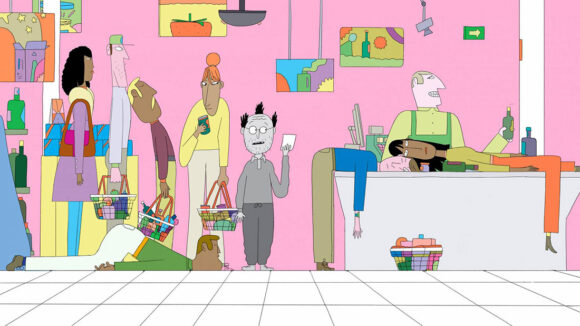

Annecy Pitches: 5 TV Projects That Caught Our Eye
While the greatest animated works of the moment play at Annecy Online, a parallel event is showcasing the films and tv shows that will fill future editions of the festival. At MIFA, the market counterpart to Annecy, creators and producers have been presenting 10-minute online pitches of projects they’re currently developing.
Naturally, we’ve been watching. We reported on pitches for features and shorts yesterday. Read on to discover the tv series that we found most interesting…
Paradise Town

After the second world war, the U.K. government set about constructing “new towns” — urban developments built on grand utopian ideals. They soon came to be seen as dreary places to live, which, to Felix Massie’s eyes, makes them an ideal setting for a biting social satire.
The inhabitants of Paradise Town aren’t a happy bunch, and their inner discontents are manifested in their outward appearances: meet Boring Simon, a man so boring his skin is gray, and Annabel Half-Done, whose inability to finish tasks is reflected in the scribbled pencil lines that criss-cross her body. Each episode will focus on one character. The project emanates a very British brand of miserabilist humor which is familiar from Massie’s shorts — and which I, as a Brit, love.
Format: 6 x 25 min
Producer: Nexus Studios
Looking for: Broadcaster
Normal Town

Normal Town is the antithesis to Massie’s Paradise Town. It’s a candy-colored Latin American community in a suspended in a state of permanent celebration. Every day, the inhabitants observe a different holiday, whether wholly fictional or inspired real-life traditions. Our guides through the chaos are a pack of peppy pre-teens (the age group at which the series is aimed).
There’s a narrative through-line that the pitch didn’t quite unpack — something about evil corporations and world domination — but the show’s main interest lies in the way it reveals the various carnivals and superstitions of the region. Bambú Orellana, the Chilean creator, clearly states that his aim is to bring these cultures to a global audience. Latin America has a dynamic animation scene, and Normal Town is indicative of how its stories are swiftly becoming everyone’s stories.
Format: 26 x 11 min
Producer: Typpo Creative Lab
Looking for: Co-producers, broadcaster
Where It Falls

In the wake of a calamity that tilted the whole world by 90 degrees, two young girls set off on an airship voyage to find their lost mother. It’s a simple concept with the potential for much visual inventiveness; concept artwork showed epic vistas of the upended fantasy world. The mode leans toward steampunk, and there’s a hint of anime in the character design. No surprise that creator Guillaume Dousse cites Hayao Miyazaki as an influence.
Where It Falls is being developed at buzzy Danish studio Sun Creature. They’re aiming high with this kids’ show, going for a detailed, naturalistic style with the production values of a feature film. The narrative is ambitious, too. In the first season alone — 180 minutes in total — the characters are supposed to get from France to Australia by zeppelin. If Dousse and company can pull this off, it will be special.
Format: 6 x 30 min
Producer: Sun Creature
Looking for: Scriptwriter, investors, broadcasting/streaming partners
Douce (Meek)

Meek is your average mother of four: she is self-centered, a heavy drinker, and capable of killing her kids at the press of a magic button. In fact, as creator Isabelle Lenoble explains, the character embodies the “frustrations, cravings, and craziness” that all stressed moms feel, yet can’t fully express. She subverts the societal view of mothers as saints. She is, Lenoble summarizes, the Homer Simpson of motherhood.
Lenoble speaks from experience. A mother of three herself, she conceived Meek as a comic strip to vent her emotions during pregnancy. This animated adaptation preserves the dashed-off crudeness of the comic — a style that suits the trashy humor — as well as its concision (the episode length is currently set at four minutes). Lenoble is right: the pains of motherhood is a subject that’s too little discussed in society, let alone animation.
Format: 15 x 4 min
Producer: Vivement Lundi!
Looking for: Broadcaster, distributor, investors, publisher (the producers are considering simultaneously developing Meek as a comic)
Boys Boys Boys

Here’s another French production that, like Meek, homes in on an aspect of gender that has only recently started to be discussed in earnest. Boys Boys Boys presents stereotypes about men — an appetite for fighting, or for flirting — then explores “other models, other possibilities” for masculinity.
The show is rooted in documentary. Each episode is structured around at interview with a man who has, at some point, felt that he doesn’t fit the mold of “manliness.” His comments are then interpreted in allegorical visuals: for instance, the animation may show a guy on a bike competing against racing cars, to convey the speaker’s feeling of inadequacy. It’s a playful approach to a worthy subject. Notably, the interviewer and director, Clawdia Prolongeau and Valentine Vendroux, are both women.
Format: 10 x 10 min
Producer: Melting Productions
Looking for: Not stated

.png)